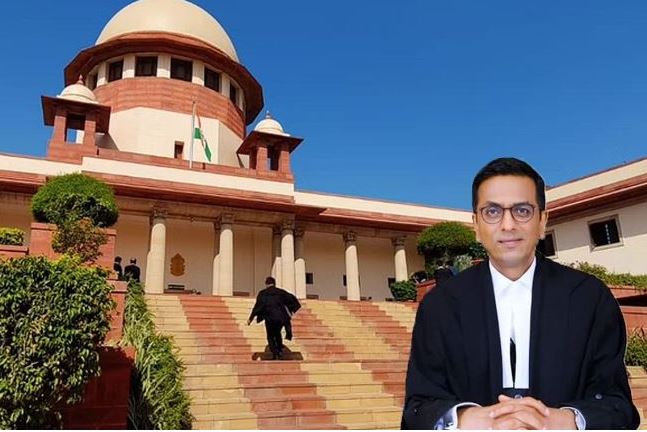
The outgoing (CJI) Chief Justice of India names the senior-most judge as his/her successor before resigning from office after the Union Minister of Law and Justice seeks the recommendation.
CJI Lalit is set to retire on November 8, 2022.
Chief Justice of India U U Lalit Tuesday recommended the second most senior judge of the Supreme Court Justice Dhananjaya Yashwant Chandrachud (DY Chandrachud) as his successor.
CJI Lalit handed over the letter to Justice Chandrachud at a gathering of SC judges in the top court’s judge’s lounge Tuesday 11th October, 2022 morning.
On being accepted by the government, Justice Chandrachud will be the 50th Chief Justice of India. While CJI Lalit has only a short tenure of below three months in office, Justice Chandrachud will have a longer tenure and will be in office for two years, till November 10, 2024.
A Law graduate from Delhi University, Justice Chandrachud got his LLM degree and a Doctorate in Juridical Sciences (SJD) from the Harvard Law School, US.
Son of former CJI (Y V Chandrachud) Yashwant Vishnu Chandrachud, he then practiced law at the Supreme Court and the Bombay High Court and was designated as a senior advocate by the Bombay HC in June 1998.
He also served as the additional solicitor general (ASG) from 1998 until he was appointed as a judge of the Bombay High Court on March 29, 2000, and also served as the director of the Maharashtra Judicial Academy. Justice Chandrachud took over as the chief justice of the Allahabad High Court on October 31, 2013, and was appointed a judge of the Supreme Court on May 13, 2016.
During his tenure in the SC, Justice Chandrachud penned some very important judgments that played a key role in the evolution of the country’s jurisprudence.
In his concurring judgement in the Navtej Singh Johar and Others vs Union of India case where the SC decriminalized Section 377 of the Indian Penal Code (IPC) making same-sex intercourse legal, he termed it “antiquated and anachronistic colonial-era law forcing” sexual minorities “to live in hiding, in fear, and as second-class citizens”.
Last month, in a significant ruling on reproductive rights, the Supreme Court bench headed by him extended the right to safe and legal abortion up to 24 weeks into pregnancy to unmarried and single women, saying it is the “right of every woman to make reproductive choices without undue interference from the State”.
As the head of the e-Committee of the SC, he also played a key role in making virtual hearings possible during the Covid-19 pandemic and also in starting live-streaming of the court’s proceedings, starting with cases being heard by the Constitution Benches.

















